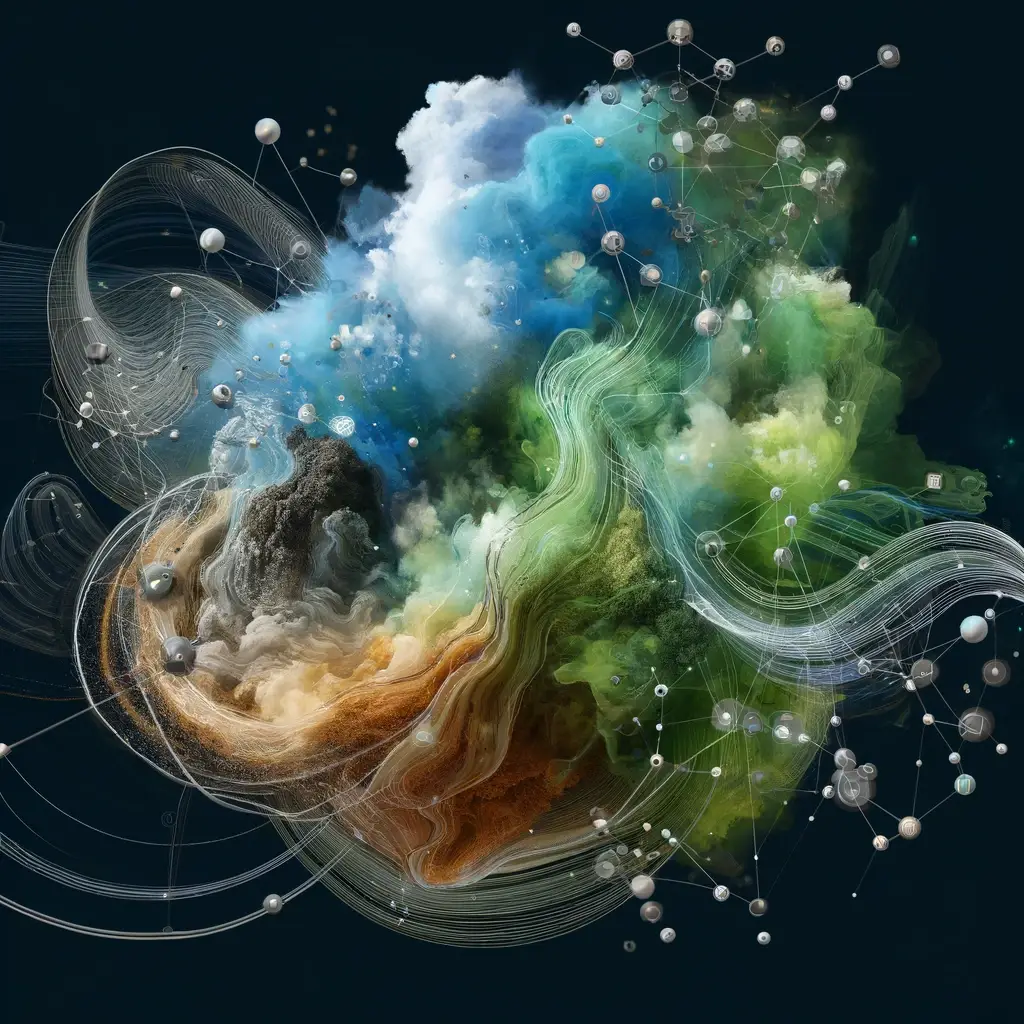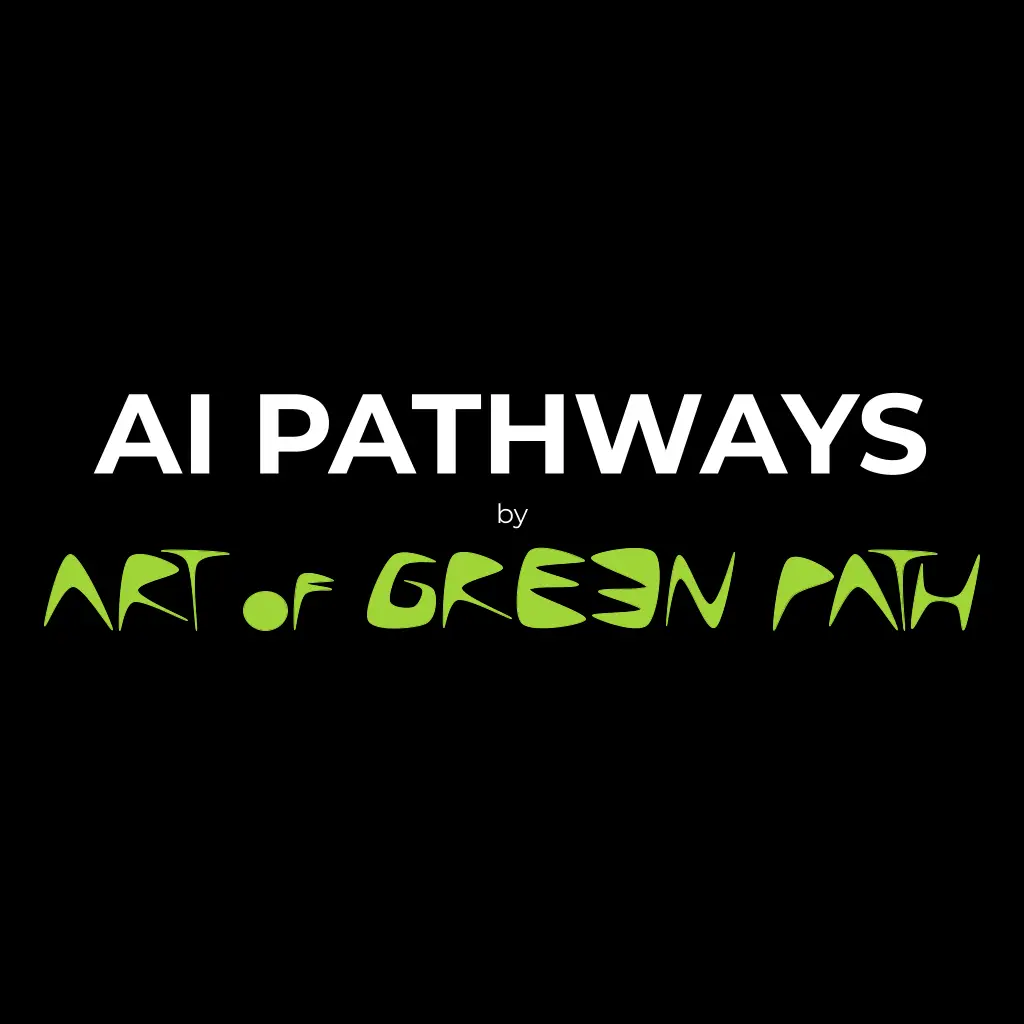Whether you need full guidance on how to use AI to elevate your business or you already have a clear idea of what you need – our comprehensive creative approach can help you with all phases like AI understanding, AI education, AI creation, AI ecosystem design and AI implementation.
From AI readiness assessment and AI opportunities recommendation over AI strategy and usage of generative AI for business innovation and automation.
Art Of Green Path and Roman Kos are your trustful partners in AI innovation.
To provide insight into the evolving landscape of AI-driven careers, focusing on the skills needed for AI jobs, the impact of AI on job opportunities, and how to prepare for the future workforce shaped by AI.
Comprehensive understanding of AI’s influence on job markets and opportunities.
Guidance on acquiring AI-related skills for career advancement.
Strategies to navigate and adapt to an AI-driven economy and workplace.
Before: Concerns, anxiety and lack of knowledge about AI’s impact on jobs and careers.
After: Informed and prepared for AI-powered careers, with insights into required skills and future job trends.



Welcome to a journey into the heart of the future workplace, where Artificial Intelligence (AI) is not just a buzzword but a dynamic reality reshaping the fabric of our professional lives. The advent of AI is transforming job markets, creating new career paths, and redefining the skills required to thrive in an ever-evolving digital landscape.
In “Preparing for the Future: AI-Powered Careers and Job Opportunities” we explore the myriad ways AI is influencing and shaping various industries, from healthcare and finance to creative arts and technology. This comprehensive guide is designed to provide you with insights into the emerging world of AI-driven careers, equipping you with the knowledge to navigate this new era with confidence and foresight.
Through this page, we’ll delve into how AI is creating new job opportunities, the essential skills required to excel in an AI-integrated job market, and the ethical considerations surrounding AI employment. We’ll also examine the challenges and opportunities presented by advanced AI technologies, preparing you for the transformative impact AI will have on your career and the broader workforce.
Join us as we embark on this exciting exploration of AI-powered careers, where the fusion of human ingenuity and artificial intelligence opens up a realm of unprecedented possibilities and opportunities for personal and professional growth.
People tend to underestimate the speed at which AI is developing, but overestimate how rapidly it will be able to be integrated into business and society.
The integration of Artificial Intelligence (AI) is significantly transforming the global job landscape. This chapter delves into these transformations, showcasing the profound impact of AI across various industries, and how it is reshaping the dynamics of the workplace, including remote work and global collaboration.
Healthcare: AI is revolutionizing patient care through predictive diagnostics and personalized treatment plans. For example, AI algorithms are being used to analyze medical images for early detection of diseases, improving patient outcomes (Source: Nature, “Deep Learning for Predictive Diagnosis”).
Manufacturing: In manufacturing, AI enhances efficiency through predictive maintenance and quality control. A notable case is General Electric, which uses AI to predict equipment failures before they occur, significantly reducing downtime (Source: GE Reports, “Predictive Maintenance”).
Generative AI, a groundbreaking development in the AI landscape, is significantly influencing various professional domains, including creative fields, programming, and marketing. These tools leverage advanced machine learning techniques to generate new content, from art and music to code and marketing materials, enhancing creativity and efficiency.
Impact on Creators: Artists and designers are utilizing AI tools like DALL-E or Runway ML to push the boundaries of creativity. These tools assist in generating unique visual concepts, transforming the creative process by expanding the range of possibilities for artistic expression.
Revolutionizing Programming: For programmers, AI tools like GitHub’s Copilot, powered by OpenAI’s Codex, are changing the way code is written. By suggesting code snippets and entire functions, these tools accelerate development time and aid in solving complex coding challenges.
Transforming Marketing: In marketing, AI tools are being used to create personalized content at scale. Platforms like Persado apply AI to generate optimized marketing language, significantly increasing engagement rates by tailoring messages to target audiences.
The advent of Generative AI tools marks a significant shift in how professionals across various fields approach their work. By augmenting human creativity and efficiency, these tools are not just tools for execution but partners in innovation, opening new horizons for professionals to explore and excel in their respective domains.
Enabling Remote Work: AI tools like virtual assistants and AI-driven project management software are making remote work more efficient. A study by Owl Labs shows that AI-supported remote workers experience higher productivity (Source: Owl Labs, “State of Remote Work 2023”).
Facilitating Global Collaboration: AI is breaking down geographical barriers, enabling effective international collaboration. Tools like Google Translate’s AI-powered language translation are simplifying cross-border communication.
New Skill Sets: The demand for AI literacy and digital competencies is on the rise. Employers are increasingly looking for employees who can work alongside AI technologies.
Adapting Work Environments: Workplaces are evolving to integrate AI, automating routine tasks and aiding in complex decision-making processes.
Importance of Lifelong Learning: In the age of AI, upskilling and reskilling become essential. Continuous learning is key to staying relevant in the changing job market.
Resources for Skill Development: Platforms like Coursera offer courses on AI and machine learning, providing pathways for professionals to acquire necessary AI skills.
The future of work in the AI age promises innovation and opportunities. Understanding these changes and preparing for them equips individuals to excel in an AI-integrated job market. Embracing AI not only as a tool but as a catalyst for career evolution is essential in this dynamic era.
As AI continues to evolve and integrate into various sectors, its impact on career paths and workplaces is profound and far-reaching. This chapter delves into how AI is currently shaping job roles and what the future may hold as AI technologies advance.
Automation and Efficiency: In many sectors, AI is automating routine tasks, allowing professionals to focus on more complex and strategic aspects of their jobs. For example, in finance, AI is used for data analysis and risk assessment, enabling financial analysts to concentrate on decision-making and client relations.
Emerging Roles: AI is also creating new job roles. Roles like AI Ethicist, Machine Learning Engineer, and Data Scientist are in high demand, reflecting the growing need for expertise in developing, managing, and ethically implementing AI technologies.
Collaborative Work Environments: Future workplaces will likely see increased collaboration between humans and AI systems. AI’s role will evolve from a tool to a teammate, capable of providing insights, generating ideas, and even predicting market trends.
Skills for the Future: As AI assumes more routine tasks, the emphasis will shift to skills like critical thinking, creativity, and emotional intelligence. These uniquely human skills will become increasingly valuable in an AI-dominated work landscape.
Continuous Learning and Adaptation: To remain relevant, professionals will need to embrace lifelong learning, continually updating their skills to keep pace with AI advancements.
Navigating Career Transitions: As AI transforms industries, many professionals may need to transition to new roles or sectors. This will require a focus on transferable skills and adaptability to new technologies and work environments.
Emphasizing AI Literacy: Understanding the basics of AI and its applications in one’s field will become essential. Resources for learning about AI include online courses, webinars, and workshops.
Adapting to Change: Professionals should be prepared to adapt their skills and approach to work, embracing AI as a part of their career development and recognizing the opportunities it presents
The impact of AI on career paths and workplaces is dynamic and multifaceted. By understanding these changes and preparing for the future, professionals can navigate an AI-integrated job market successfully. Embracing AI not only as a technological tool but as a fundamental component of modern work culture is key to thriving in the future workforce.
The AI job market is rapidly expanding, offering a wealth of opportunities for those equipped with the right skills. This chapter focuses on identifying these key skills and the unique opportunities provided by Generative AI tools such as GPT-4 and Google Gemini.
Technical Proficiency: Knowledge in areas like machine learning, data science, and AI algorithm development is increasingly valuable. For those interested in technical roles, understanding programming languages such as Python, and tools like TensorFlow, is essential.
AI Literacy: For non-technical roles, a basic understanding of AI and its applications in your field can be a significant asset. Familiarity with AI concepts and the ability to work alongside AI tools is becoming increasingly important.
Generative AI Tools: Tools like OpenAI’s GPT-4 and Google’s Gemini are redefining what’s possible in fields ranging from content creation to programming. GPT-4, with its advanced natural language processing capabilities, is being used for everything from writing assistance to complex problem-solving. Google Gemini, while still emerging, promises to further expand the capabilities of AI in various domains.
Career Opportunities: These tools create opportunities for new roles such as AI trainers, who teach AI models how to respond appropriately, and AI ethicists, who ensure AI tools are used responsibly. They also enhance existing roles – marketers can use AI to generate creative content, while programmers can leverage AI to write more efficient code.
Staying Informed: Keeping up-to-date with the latest developments in AI tools and technologies is crucial. Online resources, tech blogs, and webinars are great ways to stay informed.
Practical Application: Gaining hands-on experience with AI tools, through projects or collaborations, can significantly enhance your understanding and skill set. Participating in AI-related online communities or open-source projects can provide practical experience.
Enhancing Creativity and Efficiency: Generative AI is not just automating tasks but also enhancing human creativity and efficiency. For example, GPT-4 can assist in brainstorming sessions, while Google Gemini could potentially automate and optimize certain aspects of digital marketing strategies.
Changing Job Roles: As these tools take on more complex tasks, job roles will evolve to focus more on strategy, creativity, and overseeing AI-driven processes.
The AI job market, especially with the advent of Generative AI tools like GPT-4 and Google Gemini, is rich with opportunities. Acquiring the right skills and staying informed about AI advancements are key steps in preparing for and excelling in AI-powered careers. Embracing these tools can lead to enhanced creativity, efficiency, and new career pathways.
In the AI-driven job market, a combination of hard (technical) and soft (interpersonal) skills is crucial. This chapter explores how professionals can develop this blend of skills to thrive in AI-enhanced workplaces.
In an AI-enhanced job market, possessing a mix of hard and soft skills is indispensable. By developing technical AI skills alongside strong interpersonal abilities, professionals can position themselves for success in a variety of AI-driven roles. This chapter underscores the need for a holistic approach to skill development, ensuring readiness for the multifaceted challenges and opportunities of AI-powered careers.
In today’s world, the intersection of technology and sustainability is increasingly important. This chapter explores how careers in AI can contribute to sustainable solutions and offers guidance on pursuing pathways that blend AI expertise with a commitment to sustainability.
AI careers offer significant opportunities to contribute to sustainability efforts. By combining AI expertise with a commitment to sustainable practices, professionals can pave the way for innovative solutions that address some of the most pressing environmental challenges of our time. This chapter encourages readers to explore AI’s potential in driving sustainability, highlighting the importance of ethical considerations and the vast opportunities in this evolving field.
AI’s rapid advancement raises concerns about job displacement, but it also creates new opportunities. This chapter examines the implications of AI on the job market and offers strategies for adapting to and capitalizing on these changes.
Automation and Redundancy: Certain tasks and roles, particularly those involving routine, repetitive activities, are increasingly automated by AI. This shift can lead to job displacement in sectors like manufacturing and administrative services.
Economic Studies and Predictions: Reference studies, such as those by the World Economic Forum, which predict both job displacement and creation due to AI, offering a balanced view of the future job market (Source: World Economic Forum, “The Future of Jobs Report”).
New Roles and Sectors: While some jobs are being automated, AI is also creating new roles. These include AI supervisors, machine learning model trainers, and AI ethics compliance managers. Additionally, AI is giving rise to entirely new sectors, such as AI-driven healthcare diagnostics and personalized education.
Success Stories: Share real-life examples of individuals or companies that have successfully adapted to these new roles, illustrating the potential for career growth and transition.
In each of these fields, the key challenge is to leverage Generative AI as a supportive tool while maintaining the unique insights, creativity, and ethical standards that human professionals bring to their work.
Reskilling and Upskilling: Emphasize the importance of continuous learning to adapt to the evolving job market. Highlight resources for reskilling, such as online courses, workshops, and industry certifications.
Career Transitioning: Offer advice on transitioning to AI-related fields, including identifying transferable skills and leveraging professional networks and mentorships.
Enduring Relevance of Human Skills: Despite automation, skills such as creativity, emotional intelligence, and problem-solving remain highly valued and cannot be replicated by AI. These skills will be crucial in roles that require human interaction, decision-making, and ethical considerations.
While AI poses challenges in terms of job displacement, it also opens up a realm of new opportunities. By understanding these changes, proactively reskilling, and focusing on enduring human skills, professionals can navigate the AI-driven job market successfully. This chapter aims to provide a realistic yet optimistic outlook, encouraging adaptation and continuous learning in the face of AI-induced job market transformations.
This chapter examines the intricate relationship between AI, ethical creation, the responsibilities of AI professionals, and the pursuit of purposeful AI applications.
The interplay between AI, ethical creation, responsibility, and purpose is pivotal in shaping a future where AI benefits society. By embedding ethical considerations into AI development and use, professionals can ensure their work not only drives innovation but also aligns with broader societal values and contributes positively to global challenges.
AI’s influence extends beyond professional spheres, impacting lifestyles, education, and societal norms. This chapter explores these broader implications, offering insights into how AI is shaping our future as a species and as a society.
Lifestyle Enhancements: AI is increasingly embedded in daily life, from smart home devices to personalized healthcare recommendations. An example is the use of AI in wearable technology that monitors health metrics and provides tailored fitness advice.
Educational Evolution: In education, AI is enabling personalized learning experiences. Platforms like Khan Academy use AI algorithms to adapt to individual learning styles, enhancing student engagement and understanding.
AI in Governance: AI’s potential in governance includes improving public services and policy making. Estonia, for instance, uses AI to offer e-residency and digital public services, streamlining government processes (Source: E-Estonia, “Digital Society”).
Cultural Shifts: AI is influencing cultural dynamics by altering how we consume media, interact socially, and understand the world. The rise of AI-driven news aggregators and social media algorithms exemplifies this shift.
Changing Educational Needs: The growing role of AI in various sectors necessitates a shift in educational focus towards skills like AI literacy, critical thinking, and adaptability.
New Forms of Employment: AI is giving rise to new job categories and career paths, such as AI ethicists, data privacy managers, and more, that didn’t exist a decade ago.
Enhancing Human Capabilities: AI is not just automating tasks but also augmenting human capabilities, enabling us to solve complex problems more efficiently and creatively.
Ethical and Societal Considerations: As AI advances, ongoing dialogue and ethical considerations are essential to ensure that AI development aligns with human values and societal needs.
The role of AI in shaping the future of humanity is profound and all-encompassing. From transforming our daily lives and education to redefining societal structures and workforce development, AI is a pivotal force in human advancement. Embracing this technology responsibly and ethically is crucial in steering its development towards enhancing human capabilities and addressing global challenges.
As AI evolves towards higher levels of intelligence, it’s imperative that we instill it with human values and ethics. This chapter discusses the importance of aligning AI development with positive human values and preparing for the ethical challenges of super-intelligent AI.
AI for Humanity’s Best: AI should be a force for good, reflecting our highest ethical standards. An example is Google’s DeepMind, which prioritizes AI safety and ethics in its projects, ensuring that their AI developments benefit humanity (Source: DeepMind, Ethics & Society).
Integrating Human Values in AI Systems: The development of AI should include inputs from diverse cultural and ethical backgrounds to ensure it aligns with a broad range of human values. Initiatives like OpenAI’s Charter highlight the importance of broad and rigorous safety and ethics reviews in AI development (Source: OpenAI, Charter).
Understanding the Potential of Superintelligence: Super-intelligent AI, which could surpass human cognitive abilities, presents both opportunities and challenges. It’s crucial to consider scenarios where AI decision-making might conflict with human values.
Mitigating Risks: Proactive measures are essential to prevent potential negative impacts. Collaborations like the Partnership on AI, which brings together diverse stakeholders to study and formulate best practices on AI technologies, play a vital role in this (Source: Partnership on AI).
Courses and Workshops on AI Ethics: Universities and online platforms are increasingly offering courses focused on the ethical aspects of AI. For example, Stanford University offers a course titled “AI Ethics” that delves into the moral implications and societal impacts of AI (Source: Stanford University, AI Ethics Course).
Industry and Academic Collaboration: By working together, tech companies and academic institutions can ensure that AI is developed responsibly. Forums like the AI Ethics Lab provide a space for discussions and collaborations on these issues (Source: AI Ethics Lab).
Promoting Ethical Development and Use of AI: AI professionals must commit to ethical AI development, ensuring their work adheres to high ethical standards and positively impacts society.
Engaging in Ethical AI Discussions: Participation in AI ethics forums, conferences, and discussions is crucial. These platforms offer opportunities to share knowledge, debate, and shape the future of ethical AI.
The journey towards integrating AI into our world responsibly is crucial. By teaching AI about positive human values and preparing for the challenges of superintelligent AI, we can ensure that this technology not only augments our capabilities but also aligns with and enhances our ethical standards. This chapter calls for a collaborative, thoughtful approach to AI development, ensuring it serves the greater good of humanity.
As we conclude this exploration of AI-powered careers, it’s clear that the future holds immense potential for those who adapt and engage with AI technologies. This final chapter is a call to action, encouraging readers to take proactive steps in integrating AI into their career paths and leveraging it for a better future.
Continuous Education: The AI landscape is ever-evolving, and staying updated is crucial. Platforms like edX and Coursera offer courses in AI, machine learning, and data science. For instance, DeepLearning.AI’s Courses and Specializations on Coursera is an excellent resource for those looking to deepen their understanding of AI applications.
Practical Experience: Apply your learning through practical projects. Participate in AI hackathons or contribute to open-source AI projects on platforms like GitHub. This hands-on experience is invaluable.
Art Of Green Path’s AI Guides: Explore our other AI Guides so you get the whole picture of AI development and impact.
Identify Opportunities: Look for ways AI can enhance your current role. If you’re in marketing, explore AI tools for data-driven customer insights. For software developers, familiarize yourself with AI development platforms like Google AI or IBM Watson.
Networking and Mentorship: Engage with AI communities online and offline. LinkedIn groups and local Meetup events can be great places to connect with AI professionals and find mentors.
Understand the Ethical Implications: Stay informed about the ethical considerations of AI. Resources like the “Ethics and Governance of AI” course by Harvard University on edX can be a good starting point.
Advocate for Responsible AI: In your professional capacity, champion the use of AI in ways that are ethical, transparent, and beneficial to society.
As you explore all of our other AI Guides, AI Services, AI Solutions and Art Of Green Path’s vision, we hope you’ll be inspired by the potential of AI to drive meaningful change. Now, we invite you to take the next step in this transformative journey.
Dive into our AI-Personalized Path Finder, Virtual AI Assistants, and AI Generated Future Scenarios. Discover how AI can enhance your personal and professional life in alignment with sustainable practices.
Whether you’re an individual seeking growth or an organization aiming for sustainable AI innovation, our tailored services are here to guide you.
Stay informed about the latest developments in AI and sustainability by subscribing to our AI PATHWAYS newsletter. Receive insights, success stories, and updates on new features and services.
Participate in our interactive workshops and events to connect with like-minded individuals and experts in the fields of AI and sustainability.
We value your experiences and insights. Share how AI has impacted your journey towards sustainability and purpose, and your story could inspire others.
Follow us, join the conversation, and spread the word about sustainable AI. Your voice can amplify the message and create a larger impact.
Your opinions and suggestions are crucial for us. Provide feedback on our tools and services to help us continuously improve and innovate.
If you represent an organization or group aligned with our mission, let’s explore potential collaborations and partnerships to further the cause of ethical and sustainable AI.
Start Today: Visit our Four Paths, develop your ideas further, consult with our experts, and begin integrating AI into your journey towards a sustainable future. Remember, every step counts, and together, we can make a significant difference.
Our Personalized Consulting & Coaching Services are tailor-made for Entrepreneurs, Impact Startups, Executives, Visionary Leaders, Business Owners, Innovators, and Professionals. We offer transdisciplinary guidance, AI strategy development, reinvention, and recommendations geared towards creating impact, fostering sustainability, driving growth, and catalyzing transformation in the AI-driven sustainable future. Our goal is to empower you to thrive in an ever-evolving landscape. Learn More!
Do you need direct help developing your business idea or creating your personal brand or harnessing the power of digital marketing or using ChatGPT in a creative and highly useful way? I offer my 1:1 Services and Solutions – from short engagements to deep immersions – check out all eight groups of them to find exactly what you need and when you need it. Learn More!
We unite AI, business and creative expertise
We are passionate about developing the best AI solutions for you
We offer highly personalized and customized services
We establish positive, long-term business relationships

Leverage AI for content creation and digital marketing. Identify areas where AI can enhance your content strategies and create detailed plans for integration.
Enhance your marketing efforts with AI-powered content creation.

Learn how to use Generative AI for innovation, research, planning, content creation, and marketing.
Unlock the potential of AI for your business.

Assess your existing data and develop tailored AI solutions. Gain data-driven insights and a personalized AI solution plan.
Tailored AI solutions specific to your business needs.

Unique combination of education, consultancy, data analysis, content creation, automation, integration and training for your specific case.
You get exactly what you need, in the shape and delivery you want.

Schedule a free 30-minute consultation to discuss your business challenges and explore AI opportunities.
Gain initial insights and recommendations tailored to your specific needs.
I help companies transform themselves using artificial intelligence
As a creative thinker, AI consultant, impact entrepreneur, and lifelong learner, I discover innovative ways to increase my positive social and environmental impact by engaging directly with the world’s most pressing problems through AI business innovation and transformative consulting and coaching.
My mission is to empower businesses and professionals to use AI for good while improving life for people and taking care of the environment.
Don’t wait! Harness the full power of AI now and adapt to an AI-powered future!
In the free Your Self Discovery Guide, you can explore interrelated topics like love, happiness, confidence and finding yourself and how they influence your personal growth.
In direct communication with me, you can understand your situation and confidently plan your desired future.
In the free Your Life Motivation Guide, you can explore interrelated topics like motivation, health, overcoming challenges and connecting to nature and discover how they inspire your adventurous spirit for change.
Through direct communication with me you can understand your opportunities and focus on their realization.
In the free Your Career Discovery Guide, you can explore interrelated topics like ideas, career goals, choices and creativity and discover how they drive your desired career change.
Through 1:1 consultancy and coaching you can match your real needs with your desired future career.
In the free Your Life Change Guide you can explore interrelated topics like life goals, purpose, reinvention and life change and find the direction you need.
Through focused personalized coaching, you can discover your purpose and ways to live it fully.
Your Self Discovery Guide introduces the premium program Path Of Awareness – which is the whole journey of self-growth in 7 modules with guiding, journalling and coaching.
Learn more about Four Paths to make your desired leap into the life you love that does good.
Your Life Motivation Guide introduces the premium program Path Of Exploration – which is the whole journey of life exploration in 7 modules with guiding, journalling and coaching.
Learn more about Four Paths to make your desired leap into a life of happiness and contribution.
Your Career Discovery Guide introduces the premium program Path Of Invention – which is the whole journey of career reinvention in 7 modules with guiding, journalling and coaching.
Learn more about Four Paths to make your desired leap into the best career for you.
Your Life Change Guide introduces the premium program Path Of Fulfillment – which is the whole journey of life reinvention in 7 modules with guiding, journalling and coaching.
Learn more about Four Paths to make your desired leap into the life of big positive impact
Our FOUR PATHS Transformative Program is an interactive AI-powered self-guiding experience where individuals and professionals looking for direction and purpose as they prepare themselves for AI-powered future.
The Art Of Green Path is an original concept and philosophy emphasizing the importance of personal creativity, conscious choice, co-creation and a deep appreciation for nature in creating a sustainable and desirable future. By embracing this philosophy, we can make positive and meaningful contributions to the world around us and build a better future for ourselves and the planet.
Art Of The Green Path’s FOUR PATHS are both visionary and practical, as they encourage you to pursue your aspirations and goals while also being mindful of the impact of your actions on the environment, on people and all living creatures and on future generations.
I have created this transformative program to inspire you and motivate you to become more in harmony with your inner self and more mindful of your creative life potential while developing profound connections with natural systems and all life. If you are looking for better ways to live your only life, these programs are for you! Learn More!
If you find this concept intriguing and vital and wonder how Art Of Green Path can help you:
to get your first personalized answers and sign up for valuable, inspiring content
to get the inspiration, motivation and guidance you need to create the career and life you love
to solve your urgent and strategic challenges in focused time
I want to inspire you to take your life back into your own hands, especially now in the age of AI.
I want to motivate you to do something bold, remarkable and meaningful (maybe as a first in your family or community) and prepare yourself for an AI-powered future.
I want you to dare speak openly about your struggles, doubts and leaps because the active path is the only path of growth.
I want to take care of nature, not only through your lifestyle but also in business decisions and business transformations with AI so you create a positive impact on social and environmental dimensions too.
Finally, I want you to inspire other silent, oppressed, unaware humans to choose life full of meaning, love, co-creation, collaboration and contribution.
I believe, everybody should find the courage to pursue their own path in business and life.
Roman Kos / Art Of Green Path founder
Art of Green Path is a platform dedicated to helping professionals navigate AI-powered future, business transformation, AI upskilling, AI customized solutions, together with previous topics like self-discovery, motivation, career change, and life transitions.
Our transformative journey hugs all dimensions of business, well-being, healthy lifestyle, creative and meaningful career and sustainable future with helping and contributing values. You can get guidance and support through personalized coaching and consulting sessions, expert advice, AI solutions and transformative AI-driven hands-on experiences.
Our approach is rooted in the belief that everyone has the power to create positive change in their lives, and we are committed to helping our clients unlock their full potential in harmony of AI and nature. So whether you’re seeking to overcome obstacles, clarify your goals, or cultivate a more profound sense of purpose and fulfillment, Art of Green Path can help.
Explore our free content and premium courses today and take the first step towards a more empowered and fulfilling life.
Executives and Leaders: To embrace digital transformation and pioneer an AI-powered future for your visionary organization.
Entrepreneurs and Innovators: To engage in strategic business transformation and harness artificial intelligence and digital marketing to drive impact.
Individuals and Professionals: To navigate personal growth, explore career change, and embark on career reinvention.
Coaches, Consultants, and Educators: To enhance your practice with AI tools and a sustainability-centered approach.
Activists and Community Builders: To champion sustainability, foster impactful community engagement, and work towards a regenerative future.
Executive AI Consultation
One-to-one consultation, brainstorming sessions, hands-on exercises, holistic view, business and entrepreneurial perspective
AI Strategy
Analysis of business goals and AI opportunities, business transformation, AI tools for sales and marketing, recommended AI use cases, AI-driven processes
AI Education
Personalized sessions, online workshops, team training, ChatGPT and other AI tools, AI models comparison and selection, employee motivation, productivity and creativity
AI Data Analysis
Internal data analysis and structuring, innovative insights, process transformation and automation, competitor analysis,
AI Content Creation
Prompt design, text generation and optimization, multimedia content, interaction design, AI-enhanced web, social media content, PR and communication
AI Business Solutions
Custom AI applications, automated AI solutions, advanced chatbots, system integration, secure and safe AI implementation, long-term optimization and upgrades
Innovation: Driving forward-thinking solutions and creative advancements.
Sustainability: Committed to promoting environmentally friendly practices.
Positive Impact: Focusing on social good and improving well-being.
Ethical AI: Ensuring transparency, fairness, and ethical standards in all AI applications.
Client-Centric: Providing tailored solutions and building long-term partnerships.
We partner with businesses and organizations committed to making a positive impact.
Our ideal clients include companies that:
Value Sustainability: Focus on environmental protection and sustainable practices.
Champion Innovation: Lead in technological advancements and creative solutions.
Promote Well-Being: Improve lives through visionary business, social good and community engagement.
Embrace Ethical Practices: Prioritize ethical AI implementations.
Seek Long-Term Partnerships: Desire ongoing collaboration and growth with AI.
Subscribe to our newsletter AI PATHWAYS by Art Of Green Path for curated and inspiring insights on the connections between AI, business and the future.
